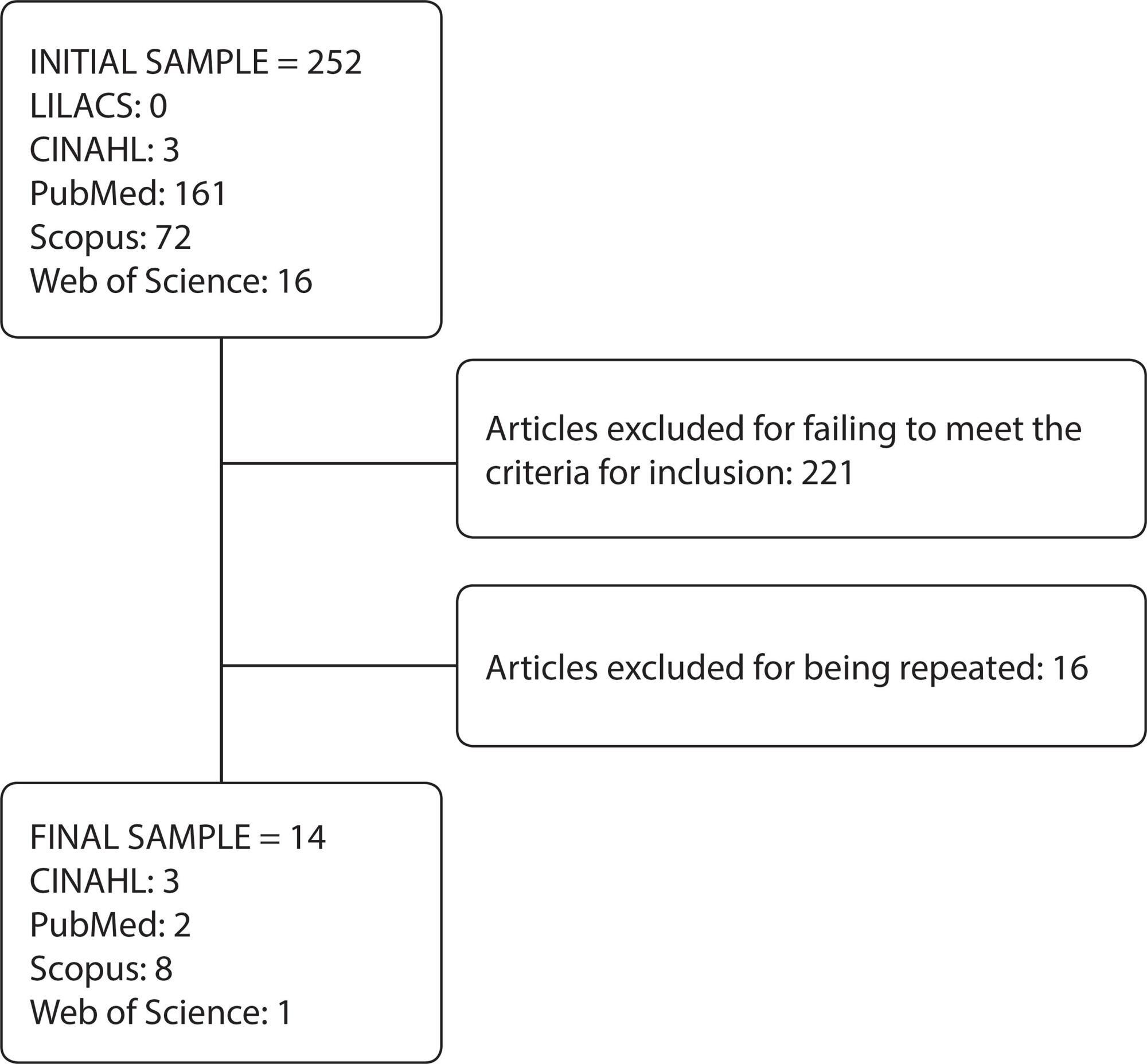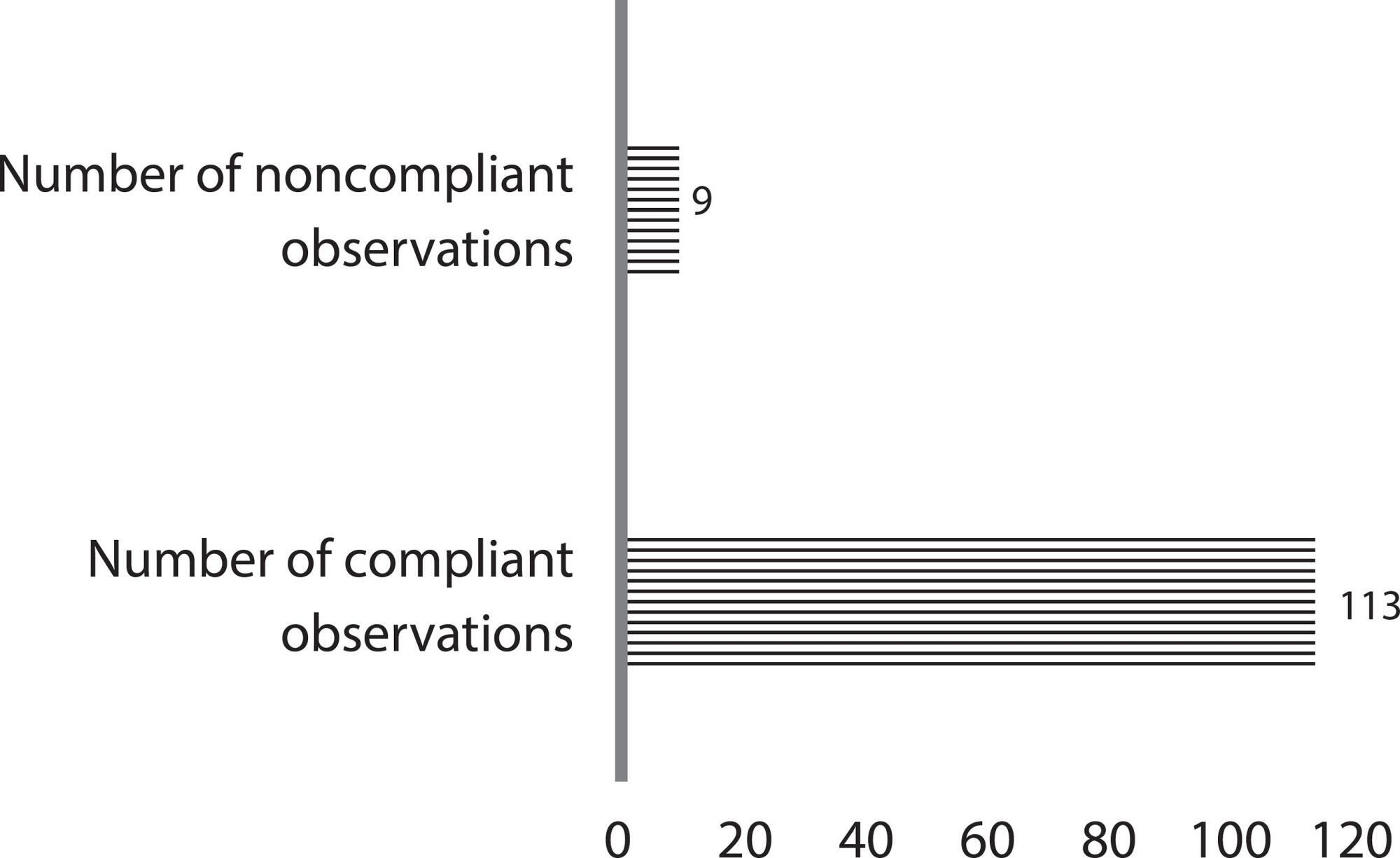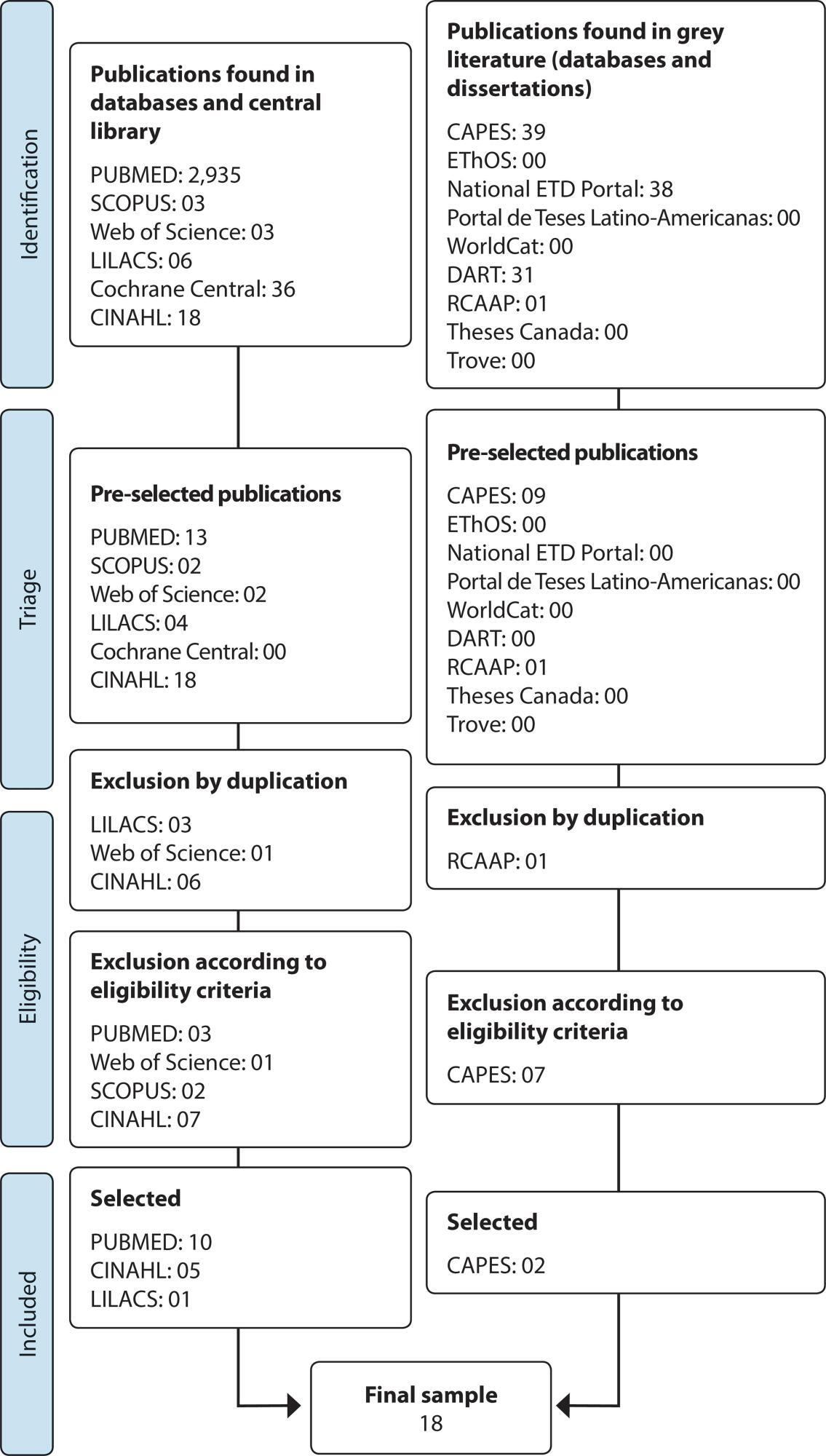-
REVIEW01-01-2018
Health promotion programs in higher education: integrative review of the literature
Revista Brasileira de Enfermagem. 2018;71:1714-1723
Abstract
REVIEWHealth promotion programs in higher education: integrative review of the literature
Revista Brasileira de Enfermagem. 2018;71:1714-1723
DOI 10.1590/0034-7167-2016-0693
Views0See moreABSTRACT
Objective:
to characterize the interventions of health promotion programs implemented in Health Promoting Universities; to analyze the results of the interventions of health promotion programs.
Method:
integrative review carried out in EBSCO, PubMed, SciELO, Scopus and Web of Science. Articles published between 2000 and 2014 were selected, with evidence of health promotion intervention programs and evaluation of results. Results: 17 articles were included. The health promotion programs aimed at increasing the welfare of students, with an emphasis on physical activity, sexual health and on improving the environment of health support within the university community.
Conclusion:
health promotion strategies in an university context do not always result from the convergence between educational, political, legislative or organizational actions that support lifestyles and conditions which are favorable to the health of individuals or groups, and that contribute to improving the physical and social environment.

-
RESEARCH01-01-2018
Contraceptive behavior of Portuguese higher education students
Revista Brasileira de Enfermagem. 2018;71:1706-1713
Abstract
RESEARCHContraceptive behavior of Portuguese higher education students
Revista Brasileira de Enfermagem. 2018;71:1706-1713
DOI 10.1590/0034-7167-2017-0623
Views0See moreABSTRACT
Objective:
To characterize the contraceptive practices of higher education students and to identify factors that contribute to the use of different contraceptive methods.
Method:
A cross-sectional, descriptive correlational study was carried out with a sample of 1946 students, with a mean age of 21 years (20.74±2.32), who attended courses at a University in the North of Portugal.
Results:
Of the factors studied, the female gender, younger ages, previous behavior of condom use, knowledge about contraception, attitude and self-efficacy for condom use were associated with safer contraceptive choices.
Conclusion:
Investing in sexual education for young people is an important public health strategy that can empower youth to make more appropriate choices and improve adherence to contraceptive methods, reducing the risk of unintended pregnancies and sexually transmitted diseases.
-
RESEARCH01-01-2018
Nursing and Global Health: social determinants of health in the training of nurses
Revista Brasileira de Enfermagem. 2018;71:1700-1705
Abstract
RESEARCHNursing and Global Health: social determinants of health in the training of nurses
Revista Brasileira de Enfermagem. 2018;71:1700-1705
DOI 10.1590/0034-7167-2017-0631
Views0See moreABSTRACT
Objective:
To evaluate to which extent nursing professors understand how social determinants of health impact on health, and whether the topic is addressed in nursing undergraduate education in Brazil.
Method:
This is a methodological study carried out with 222 nursing faculty members from Brazilian higher education institutions. The answers of the domain “Social and environmental determinants of health”, concerning a questionnaire on “Core Competencies in Global Health”, were analyzed.
Results:
Most professors have over 10 years of experience in nursing higher education. A large part of the participants strongly agreed or agreed on the importance of college subjects related to the above-mentioned topic for the education of the nurses.
Conclusion:
The professors in this study agreed that social and environmental health determinants must be taught in Nursing school, since it is necessary that nurses value this knowledge, slowly making it a part of the curriculum framework.
-
RESEARCH01-01-2018
National Licensure Exam for Brazilian Nurses: why and for whom?
Revista Brasileira de Enfermagem. 2018;71:1692-1699
Abstract
RESEARCHNational Licensure Exam for Brazilian Nurses: why and for whom?
Revista Brasileira de Enfermagem. 2018;71:1692-1699
DOI 10.1590/0034-7167-2017-0929
Views0See moreABSTRACT
Objective:
To analyze critically the reasons for regulating a National Licensure Exam for Brazilian Nurses (NLEXB-N).
Method:
Qualitative study with secondary source applying the critical discourse analysis to situate context and intertextuality in the establishment of a new social practice. We analyzed data from legal documents regulating the National Licensure Exam of other professions in Brazil, the Educational Census, the Survey of Brazilian Nursing Profile and global nursing literature.
Results:
Four themes were explored: Brazilian experiences with this exam; nursing experiences in other countries; effects of the exam on the examinees; NLEXB-N in Brazil: what purposes could we present?
Final considerations:
The National Licensure Exam for Brazilian Nurses is a measure of individual accountability that increases social injustice, inequality and inequity. We must pay attention to the consequences of its application, based on evidences produced in the area.

-
RESEARCH01-01-2018
North American nurse educators in the HOPE Earth Project and Nursing teaching
Revista Brasileira de Enfermagem. 2018;71:1685-1691
Abstract
RESEARCHNorth American nurse educators in the HOPE Earth Project and Nursing teaching
Revista Brasileira de Enfermagem. 2018;71:1685-1691
DOI 10.1590/0034-7167-2017-0825
Views0See moreABSTRACT
Objective:
analyze the activities of the North American nurse educators of the Project Health Opportunity for People Everywhere Earth (HOPE Earth Project) in Natal, state capital of Rio Grande do Norte, Brazil (1974-1981).
Method:
sociohistorical, qualitative study, resulting from filed documents and ten semistructured interviews. These sources were processed and analyzed using Oral History and Thematic Analysis.
Results:
the following categories emerged: The North American nurse educators of the HOPE Earth Project and Educator Mary Anne Small through the memories of who had contact with her.
Final considerations:
the HOPE Earth Project contributed to higher education in health at the Federal University of Rio Grande do Norte, guaranteeing the coming of qualified and experienced lecturers, and the North American educators cooperated towards the qualification of the Nursing Course, even when it was already structured and fully functioning.

-
RESEARCH01-01-2018
Teachers’ experiences about first aid at school
Revista Brasileira de Enfermagem. 2018;71:1678-1684
Abstract
RESEARCHTeachers’ experiences about first aid at school
Revista Brasileira de Enfermagem. 2018;71:1678-1684
DOI 10.1590/0034-7167-2017-0715
Views0See moreABSTRACT
Objective:
To unveil the experiences of primary and elementary school teachers about first aid at school.
Method:
a descriptive, qualitative study, conducted in May 2014, from a focus group with nine teachers from the municipal network of Bom Jesus-PI. Audio recording occurred, content was transcribed, and data were processed by IRAMUTEQ software and analyzed from the Descendant Hierarchical Classification.
Results:
Three classes were obtained: Teachers’ knowledge about first aid (influence of maternal experience, belief in popular myths and awareness of lack of preparation were indicated); Feelings in situations of urgency and emergency (anguish, fear and concern); First aid at school, (occurring in class or during break time, coming from collisions and syncope).
Final considerations:
The research evidenced experiences based on popular beliefs, family experiences and knowledge gaps. The lack of preparation was evidenced by the teachers’ reports about having misconduct during first aid at school.

-
RESEARCH01-01-2018
Problematization methodology in primary healthcare teaching
Revista Brasileira de Enfermagem. 2018;71:1671-1677
Abstract
RESEARCHProblematization methodology in primary healthcare teaching
Revista Brasileira de Enfermagem. 2018;71:1671-1677
DOI 10.1590/0034-7167-2017-0157
Views0See moreABSTRACT
Objective:
To identify the contribution of the problematization methodology in primary healthcare teaching in a nursing undergraduate course.
Method:
Documentary, descriptive and qualitative study, carried out with undergraduate students from the Ribeirão Preto College of Nursing at the University of São Paulo. Data were collected through analysis documents which consisted of 21 evaluation forms filled out by first-year undergraduate students in the 2013 school year taking the subject Comprehensive Health Care I, whose theoretical framework was focused on primary health care.
Results:
It was found that the subject met the intended goals, allowed coordination between theory and practice, and enabled the contact of undergraduate students with the profession and work environment in the beginning of the course.
Final considerations:
Analysis of the evaluation forms for the subject Comprehensive Health Care I evidenced that the use of the problematization methodology favored primary healthcare teaching.
-
RESEARCH01-01-2018
Nursing students facing moral distress: strategies of resistance
Revista Brasileira de Enfermagem. 2018;71:1663-1670
Abstract
RESEARCHNursing students facing moral distress: strategies of resistance
Revista Brasileira de Enfermagem. 2018;71:1663-1670
DOI 10.1590/0034-7167-2017-0072
Views0See moreABSTRACT
Objective:
To understand the resistance strategies adopted by undergraduate students in nursing, faced with situations of moral distress (MD).
Method:
Qualitative research, developed in three universities in the south of Brazil, two federal and one private, with 21 undergraduate students in nursing from December 2015 to February 2016; the data was submitted to the discursive textual analysis and Foucauldian theoretical reference.
Results:
Students resisting demonstrate a sense of self-preservation and moral empowerment. Moreover, non-resistance initiatives are related to the fear of possible sanctions. Thus, by resisting or not, students may experience both positive and negative repercussions.
Final considerations:
By resisting, students aim to defend what they believe to be right, demonstrating their moral empowerment in the face of their moral distress. However, the exercise of disciplinary power seems to contribute to their moral fragilization, making it difficult to implement resistance strategies.

-
08-19-2019
Institutional strategies to prevent violence in nursing work: an integrative review
Revista Brasileira de Enfermagem. 2019;72(4):1052-1060
Abstract
Institutional strategies to prevent violence in nursing work: an integrative review
Revista Brasileira de Enfermagem. 2019;72(4):1052-1060
DOI 10.1590/0034-7167-2018-0687
Views0See moreABSTRACT
Objective:
To analyze the production of research that adopted as object of investigation: institutional strategies, actions and programs to curb and/or prevent the nursing workplace violence.
Method:
Integrative review of 14 articles in full, available in the databases LILACS, PubMed Central, Scopus, CINAHL and Web of Science.
Results:
Of the articles analyzed, most arise from quantitative research (71%), carried out in the United States (65%), with educational actions (57%) and programs (43%), denoting policies.
Conclusion:
Results showed various ways to curb or prevent nursing workplace violence. These are specific strategies, there are few programs deployed worldwide, usually centered in the United States, Canada and Sweden. Most of them is well evaluated and can serve as a model for the development and dissemination of policies according to the needs of each location.

-
08-19-2019
Professional education on dementias in Primary Health Care: an integrative review
Revista Brasileira de Enfermagem. 2019;72(4):1086-1093
Abstract
Professional education on dementias in Primary Health Care: an integrative review
Revista Brasileira de Enfermagem. 2019;72(4):1086-1093
DOI 10.1590/0034-7167-2018-0652
Views0See moreABSTRACT
Objective:
To investigate the most commonly used educational approaches in dementia training for primary health care professionals.
Method:
Integrative literature review, conducted between April and June of 2018, in PubMed, LILACS and IBECS databases. The descriptors used were: Training, Health Personnel, Dementia, Primary Health Care for PubMed; and the MeSH terms, Training Programs, Health Personnel, Dementia, and Primary Health Care for LILACS and IBECS.
Results:
The sample consisted of 13 articles; eight were published in the last five years (62%); seven articles with a quantitative approach (54%); seven articles produced on the European continent (54%), followed by five published on the North American continent (38%). All journals were from the health area (100%).
Conclusion:
Educational strategies were combined and used for education. Significant improvements in knowledge, skills, and attitudes of the teams with regard to professional management of dementias were evidenced.

-
ORIGINAL ARTICLE12-05-2019
Factors associated with metabolic syndrome in older adults: a population-based study
Revista Brasileira de Enfermagem. 2019;72:221-228
Abstract
ORIGINAL ARTICLEFactors associated with metabolic syndrome in older adults: a population-based study
Revista Brasileira de Enfermagem. 2019;72:221-228
DOI 10.1590/0034-7167-2018-0620
Views0See moreABSTRACT
Objective:
To estimate the prevalence of the metabolic syndrome and clusters of its components and to identify possible associated factors in older adults.
Method:
Cross-sectional and population-based study, involving 271 older people. We collected sociodemographic, behavioral, clinical, biochemical, and anthropometric data. Data were analyzed by descriptive and logistic regression techniques.
Results:
The prevalence of metabolic syndrome was 59% and was associated with women, overweight/obesity, and the C-reactive protein. Concerning the clusters, 11.4% of the sample had all the components of the metabolic syndrome, and only 5.2% of individuals did not have any of its components.
Conclusion:
We found there is a high prevalence of metabolic syndrome and clusters of its components in older adults. It is important to deepen studies on this matter, considering clinical aspects in relation to sex and healthy behavioral habits for creating public policies as well as emphasizing actions aimed at promoting self-care in all cycles of life.

-
ORIGINAL ARTICLE02-10-2020
Common mental disorders in nursing students of the professionalizing cycle
Revista Brasileira de Enfermagem. 2020;73(1):e20180154
Abstract
ORIGINAL ARTICLECommon mental disorders in nursing students of the professionalizing cycle
Revista Brasileira de Enfermagem. 2020;73(1):e20180154
DOI 10.1590/0034-7167-2018-0154
Views0See moreABSTRACT
Objectives:
to verify the suspicion of common mental disorders in nursing students of the professionalizing cycle and the association with sociodemographic features.
Method:
cross-sectional study with a sample of 85 students from a public university in the state of Rio de Janeiro (RJ) who responded to the Self-Report Questionnaire-20 and sociodemographic questions.
Results:
the suspicion prevalence of common mental disorders (CMD) in the sample was 55.3% and it was identified the association with the consumption of alcohol. Of the most frequent SRQ-20 complaints, 95.3% reported “feeling nervous, tense or worried”, 72.9% “having difficulty making decisions”, 60% “sleeping poorly” and 37.6% “having lost interest by things “.
Conclusion:
high prevalence of CMD in the sample and the association with the consumption of alcohol requires preventive and therapeutic actions among the students that minimize the possibility of severe mental disorders related to the consumption of alcohol and other drugs.
-
REVIEW07-13-2020
Prevention and control measures for neonatal COVID-19 infection: a scoping review
Revista Brasileira de Enfermagem. 2020;73:e20200467
Abstract
REVIEWPrevention and control measures for neonatal COVID-19 infection: a scoping review
Revista Brasileira de Enfermagem. 2020;73:e20200467
DOI 10.1590/0034-7167-2020-0467
Views0See moreABSTRACT
Objective:
to identify with the literature the measures to prevent and control neonatal infection by COVID-19.
Methods:
a scope review carried out by searching for studies in databases and institutional health websites. The final sample was 25 articles.
Results:
among the main measures are the use of masks by suspected or infected people in contact with healthy newborns, hand hygiene before and after each care and feeding as well as the tools used for milking. It is indispensable to use personal protective equipment by health professionals in neonatology services to maintain a private room for infected newborns or to use physical barriers. Early diagnosis and timely case management is essential to reduce virus transmissibility.
Conclusions:
the research contributed to elucidate health and nursing actions in preventing and controlling neonatal infection by COVID-19.

-
ORIGINAL ARTICLE06-27-2019
Insertion of central vascular catheter: adherence to infection prevention bundle
Revista Brasileira de Enfermagem. 2019;72(3):774-779
Abstract
ORIGINAL ARTICLEInsertion of central vascular catheter: adherence to infection prevention bundle
Revista Brasileira de Enfermagem. 2019;72(3):774-779
DOI 10.1590/0034-7167-2018-0124
Views0See moreABSTRACT
Objective:
To evaluate the compliance of the care process involving insertion of central vascular catheter (CVC) in hemodialysis.
Method:
Cross-sectional quantitative approach developed at the hemodialysis service of a reference hospital in Sergipe, Brazil. Sample consisting of 1,342 actions evaluated, corresponding to 122 forms for monitoring and control of CVC insertion. Data collection was held from July to December 2016.
Results:
The adherence rate to the use of the insertion form was 54.9%. The procedure evaluated achieved 93% overall compliance. Of the 11 specific actions observed, seven (64%) presented 100% compliance. The density of the overall incidence of primary bloodstream infections reduced from 10.6 to 3.1 infections per 1,000 patients/day.
Conclusion:
Although the observed actions reached specific desired conformities, the use of the checklist was lower than expected. Strategies for monitoring, coaching and educational and organizational actions can contribute to safe care.

-
REVIEW06-17-2020
Prevention and conduct against the Extravasation of antineoplastic chemotherapy: a scoping review
Revista Brasileira de Enfermagem. 2020;73(4):e20190008
Abstract
REVIEWPrevention and conduct against the Extravasation of antineoplastic chemotherapy: a scoping review
Revista Brasileira de Enfermagem. 2020;73(4):e20190008
DOI 10.1590/0034-7167-2019-0008
Views0See moreABSTRACT
Objectives:
to identify and synthesize scientific evidence on prevention and management of extravasation of antineoplastic agents in adult patients by nurses.
Methods:
scoping review, according to Joanna Briggs Institute and PRISMA-ScR. Research was conducted in five electronic databases, Cochrane Library and eight catalogs of theses and dissertations. Data collection occurred from April to July 2018, with no time limit. The extracted data were analyzed and synthesized in a narrative way.
Results:
a total of 3,110 records were retrieved and 18 studies were kept for review. Most publications (66.6%) had a qualitative approach and addressed both aspects, i.e., prevention and management of extravasation of chemotherapy in adult patients.
Conclusions:
the implementation of protocols based on scientific evidence on prevention and management of extravasation of antineoplastic agents is paramount in order to provide patient safety and support to the nursing staff.

-
ORIGINAL ARTICLE12-05-2019
Functional health literacy in hypertensive elders at primary health care
Revista Brasileira de Enfermagem. 2019;72:266-273
Abstract
ORIGINAL ARTICLEFunctional health literacy in hypertensive elders at primary health care
Revista Brasileira de Enfermagem. 2019;72:266-273
DOI 10.1590/0034-7167-2018-0897
Views0See moreABSTRACT
Objective:
to assess the relationship between inadequate functional health literacy and inadequate blood pressure control in older people with hypertension in Primary Health Care.
Method:
a cross-sectional study with sample calculated at 392. SAHLPA-18 tool was used for functional health literacy; blood pressure was measured; sociodemographic and clinical data were collected. Hierarchical logistic regression was used.
Results:
(high) inadequate blood pressure and (low) functional inadequate health literacy were present in 41.6% and 54.6% of the people, respectively. Factors associated with inadequate blood pressure were: inadequate functional health literacy, black-brown skin color, overweight-obesity, hypertension diagnosis time, non-adherence to exercise/diet, drug treatment. Schooling had no association with inadequate blood pressure
Conclusion:
hypertensive elderly people with inadequate health literacy were more likely to have inadequate blood pressure. Thus, health professionals need to value functional health literacy as a possible component to control blood pressure.
Search
Search in:
Nuvem de Tags
Adolescente (85) Atenção Primária à Saúde (239) COVID-19 (91) Criança (91) Cuidados de Enfermagem (269) Educação em Enfermagem (151) Educação em Saúde (139) Enfermagem (930) Enfermagem Pediátrica (86) Estudantes de Enfermagem (77) Estudos de Validação (131) Família (87) Idoso (208) Promoção da Saúde (99) Qualidade de Vida (104) Saúde do Trabalhador (86) Saúde Mental (145) Saúde Pública (82) Segurança do Paciente (150) Tecnologia Educacional (100)



